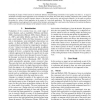Free Online Productivity Tools
i2Speak
i2Symbol
i2OCR
iTex2Img
iWeb2Print
iWeb2Shot
i2Type
iPdf2Split
iPdf2Merge
i2Bopomofo
i2Arabic
i2Style
i2Image
i2PDF
iLatex2Rtf
Sci2ools
111
click to vote
LREC
2008
2008
Can we Evaluate the Quality of Generated Text?
Evaluating the output of NLG systems is notoriously difficult, and performing assessments of text quality even more so. A range of automated and subject-based approaches to the evaluation of text quality have been taken, including comparison with a putative gold standard text, analysis of specific linguistic features of the output, expert review and task-based evaluation. In this paper we present the results of a variety of such approaches in the context of a case study application. We discuss the problems encountered in the implementation of each approach in the context of the literature, and propose that a test based on the Turing test for machine intelligence offers a way forward in the evaluation of the subjective notion of text quality.
Related Content
| Added | 29 Oct 2010 |
| Updated | 29 Oct 2010 |
| Type | Conference |
| Year | 2008 |
| Where | LREC |
| Authors | David Hardcastle, Donia Scott |
Comments (0)

